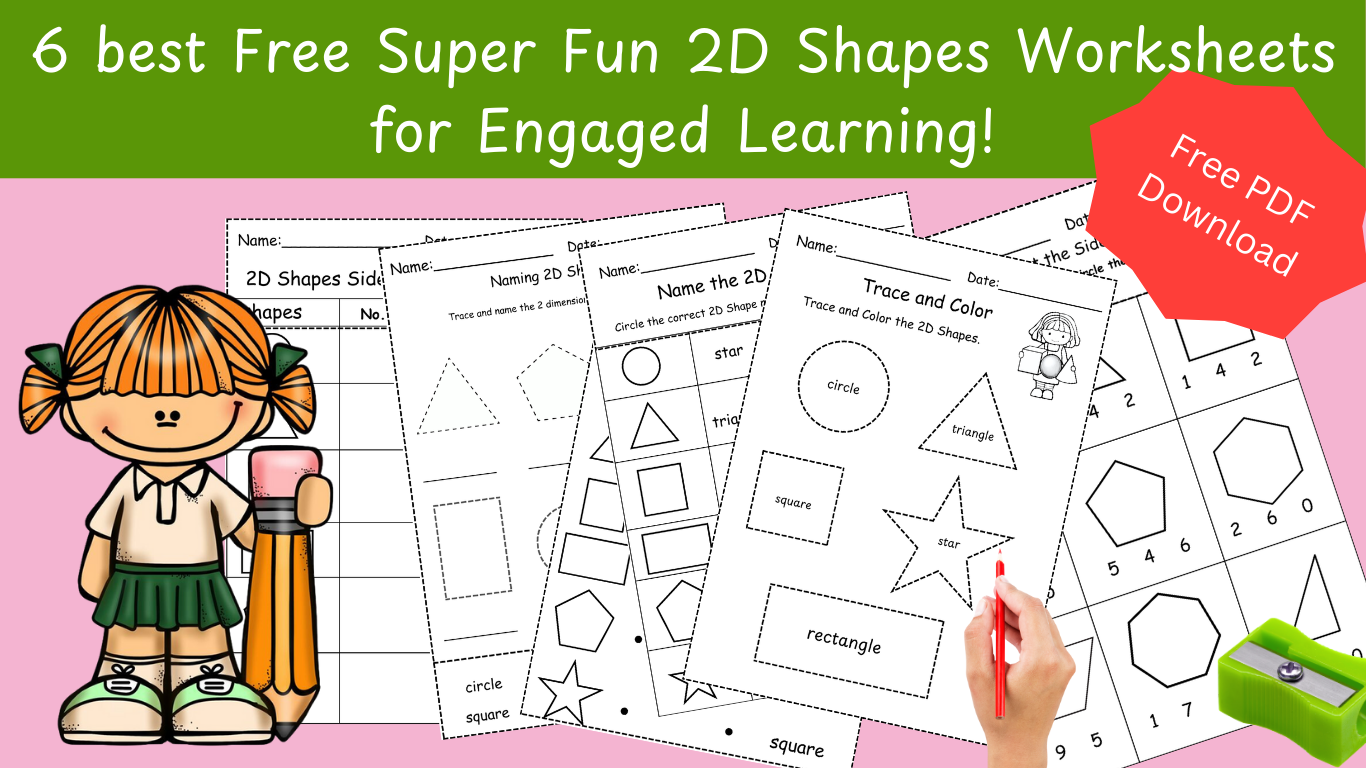Introduction to 2D Shapes
2D shapes are all around us, and they form the building blocks of early math education. From circles and squares to triangles and rectangles, these shapes make up the world we see, and understanding them is essential for young children. Recognizing and naming these shapes helps kids start their journey into geometry and spatial awareness. To make learning shapes easy and fun, we’ve designed 6 totally free 2D shapes worksheets perfect for little learners.
Why 2D Shape Recognition is Vital in Early Education
Learning 2D shapes isn’t just about identifying simple figures; it’s a key developmental step. By recognizing shapes, children start to build essential cognitive and visual skills that will later help in math, reading, and science. When children understand shapes, they’re better prepared for future concepts like sorting, pattern recognition, and geometry. This is why 2D shape learning is often one of the first math skills taught in kindergarten and preschool.
Overview of our 6 Free 2D Shapes Worksheets
Our 2D shapes worksheets are designed to introduce these shapes to young kids in a fun and engaging way. Each worksheet focuses on a different shape, and children are invited to trace, colour, and recognize each one. These activities not only make learning enjoyable but also help reinforce shape recognition through hands-on practice.
The best part? You can download all six worksheets for free! They’re ideal for both home and classroom use.
1.Trace and Colour the 2D Shapes:
Our first tracing and coloring worksheet is designed to introduce young children to basic shapes in a fun and engaging way. In this activity, kids will trace each shape’s outline, building their fine motor skills and hand-eye coordination. Once they’ve finished tracing, they can bring each shape to life with their favorite colors, making the learning process even more enjoyable. This worksheet is ideal for helping early learners recognize and remember common shapes while practicing their tracing and colouring skills, setting a strong foundation for future geometry concepts.
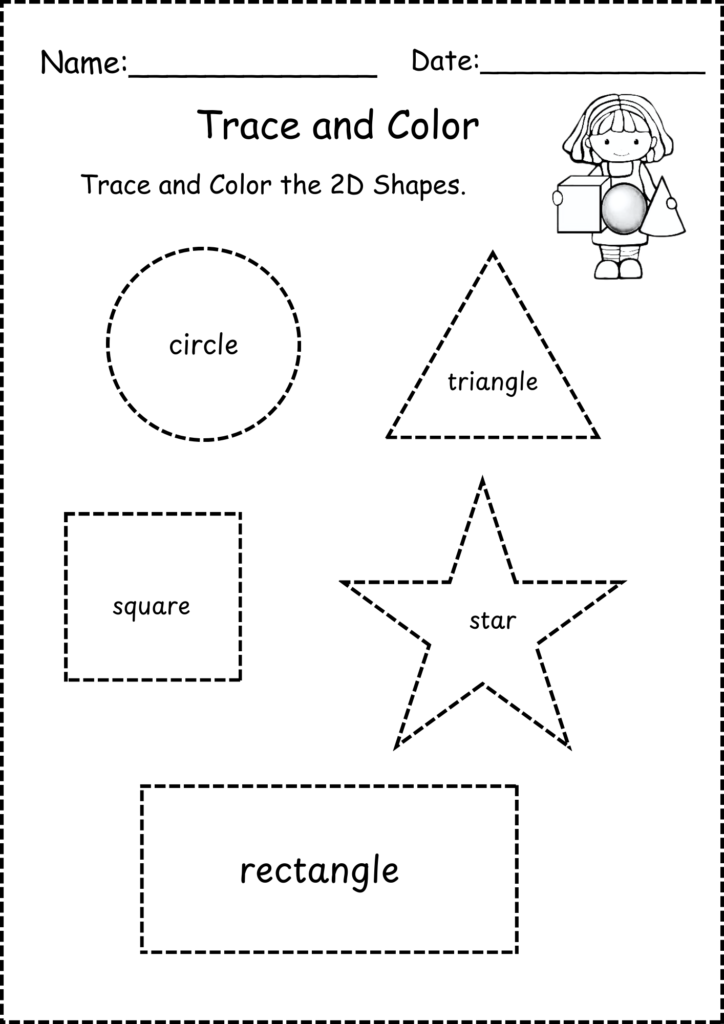
Download Free Shapes Tracing Worksheet Here
2.Match and Colour the 2D Shapes
Our second worksheet invites children to engage with shapes by matching and coloring them, creating a fun and interactive way to reinforce shape recognition. In this activity, kids will draw lines to match each shape with its corresponding pair, enhancing their visual discrimination skills. After successfully matching, they can color each shape, adding a creative element to their learning experience. This worksheet is perfect for young learners to practice identifying, matching, and coloring shapes, all while building a stronger understanding of basic geometry in a playful format.
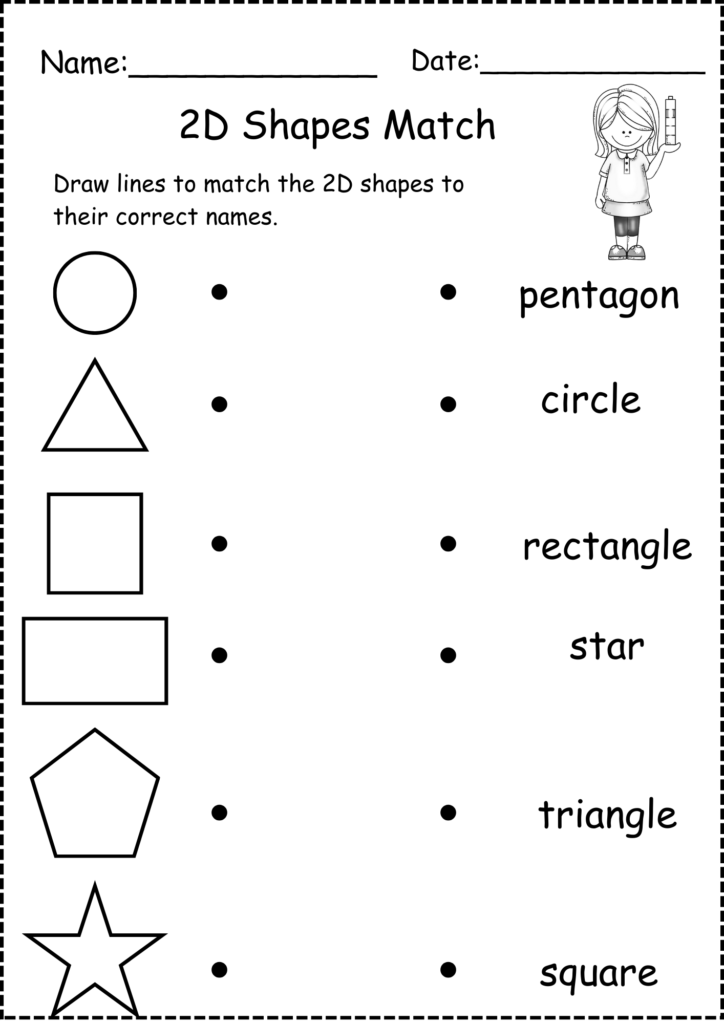
Download Free Shape Match Worksheet Here
3.Name the 2D Shapes :
This worksheet is a fun and educational tool for helping children learn the names of 2D shapes. With the assistance of a word bank, kids will fill in the blanks by writing the correct names of shapes such as circles, squares, triangles, and more. Each shape is clearly illustrated, providing visual support as children practice spelling and recognizing shape names. This activity enhances early literacy skills and builds shape recognition in an interactive way, making it perfect for young learners who are just starting to connect shapes with their names.

Download Free Name the 2D Shape Worksheet Here
4.Write about the sides and corners of 2D Shapes
In this worksheet, children will explore the properties of 2D shapes by identifying and writing the number of sides and corners for each one. This hands-on activity helps young learners understand the unique characteristics of shapes like triangles, squares, rectangles, and more, deepening their understanding of basic geometry concepts. By observing and counting sides and corners, kids not only reinforce their shape recognition skills but also develop their ability to analyze shapes and their structures. This worksheet is ideal for introducing foundational geometry in a fun, interactive way.
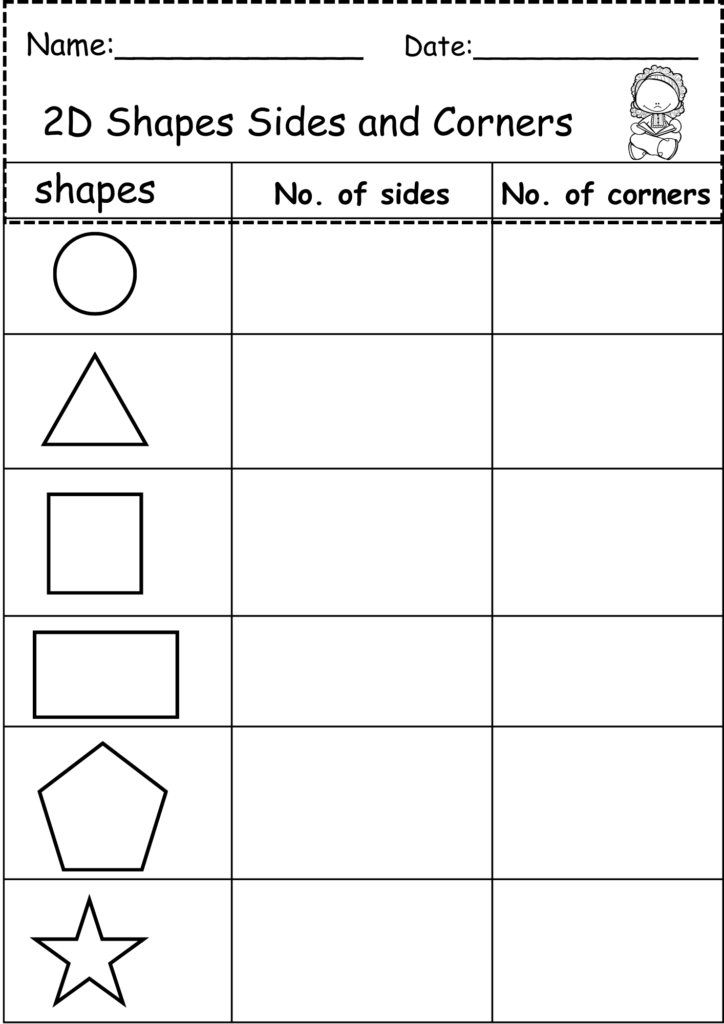
Download Free Worksheet Here
5.Circle the correct 2D Shape Name
This worksheet is designed to help children strengthen their shape recognition skills by identifying and circling the correct names of 2D shapes. Each shape is displayed clearly, with a choice of names listed below, encouraging young learners to carefully observe and select the matching label. This activity enhances visual recognition, reinforces shape vocabulary, and provides an engaging way to practice early geometry. Perfect for preschool and kindergarten students, this worksheet makes learning shapes both fun and interactive.
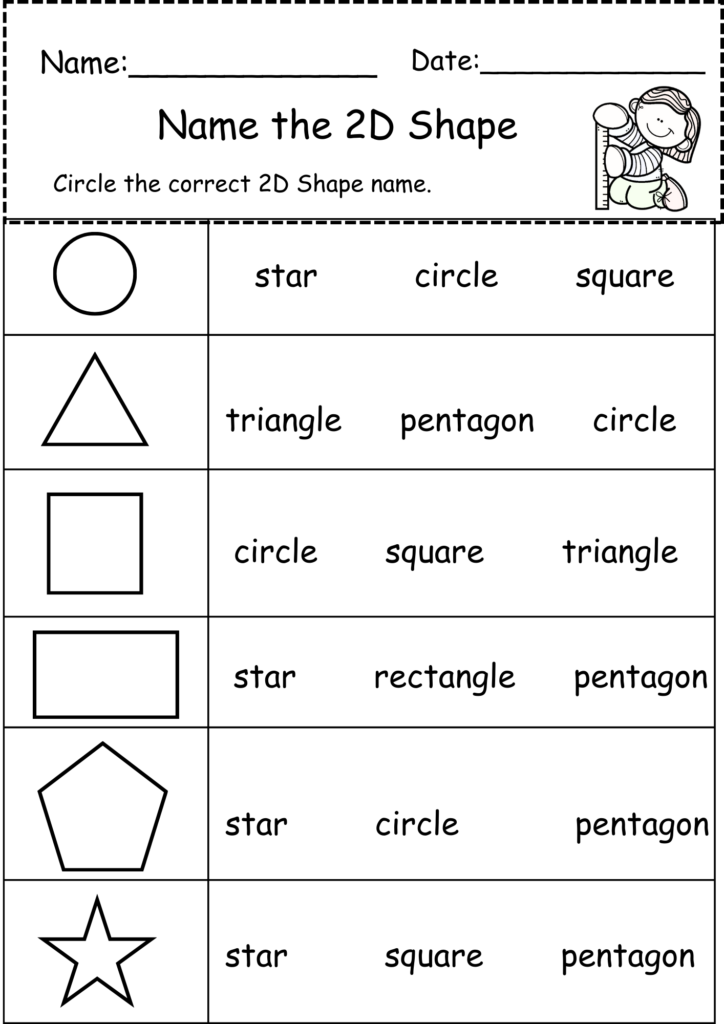
Download this Worksheet Free Here
6. Count the sides and circle the correct number
In this worksheet, children will practice counting the sides of various 2D shapes and circle the correct number from the options provided. This activity encourages careful observation and counting, helping young learners to understand the unique properties of shapes like triangles, squares, and rectangles. By identifying the number of sides, children build a foundation in basic geometry while strengthening their counting skills. This worksheet is perfect for introducing essential math concepts in an engaging, hands-on way.
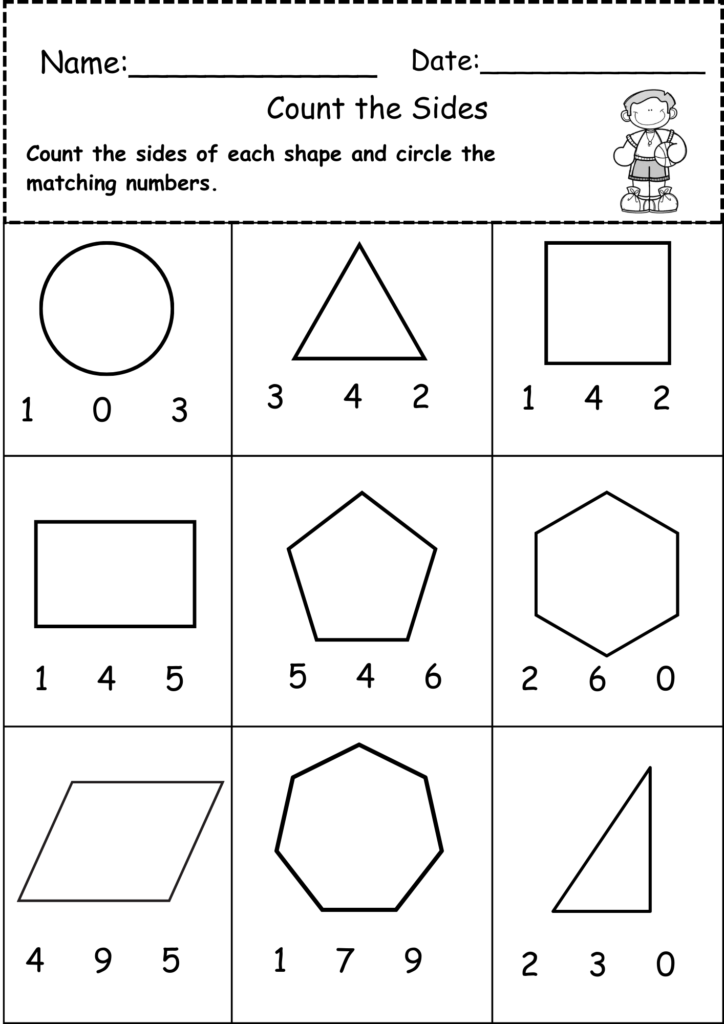
Download Free PDF Here
Benefits of 2D Shapes Free
Exploring 2D shapes through activities like counting sides, tracing, matching, and identifying names offers numerous benefits for young learners:
- Shape Recognition: Learning to identify and name shapes helps children recognize patterns and organize information, which is foundational for math skills.
- Fine Motor Development: Tracing and circling activities help strengthen the small muscles in hands and fingers, essential for writing and drawing.
- Counting Skills: Counting sides and corners reinforces early numeracy, helping children understand numbers in a tangible, visual way.
- Observation and Focus: Recognizing different shapes and their properties requires attention to detail, boosting concentration and observational skills.
- Vocabulary Building: Associating names with shapes expands children’s vocabulary, supporting early literacy development.
- Problem-Solving Skills: Matching, identifying, and circling correct answers encourages logical thinking and decision-making.
- Geometry Foundation: Introducing shapes and their properties lays a strong foundation for geometry, helping children feel confident with more complex math concepts in the future.
These activities combine fun and learning, making essential concepts memorable and enjoyable for young learners.
Conclusion:
In conclusion, engaging with 2D shapes through various interactive worksheets provides young learners with a well-rounded approach to developing essential math and literacy skills. From recognizing and naming shapes to counting sides and exploring their properties, these activities not only foster cognitive growth but also enhance fine motor skills and observation abilities. By incorporating fun and creativity into learning, children build a strong foundation in geometry that will support their future academic success. With these worksheets, educators and parents can create enriching learning experiences that make exploring shapes both enjoyable and impactful for young minds.
